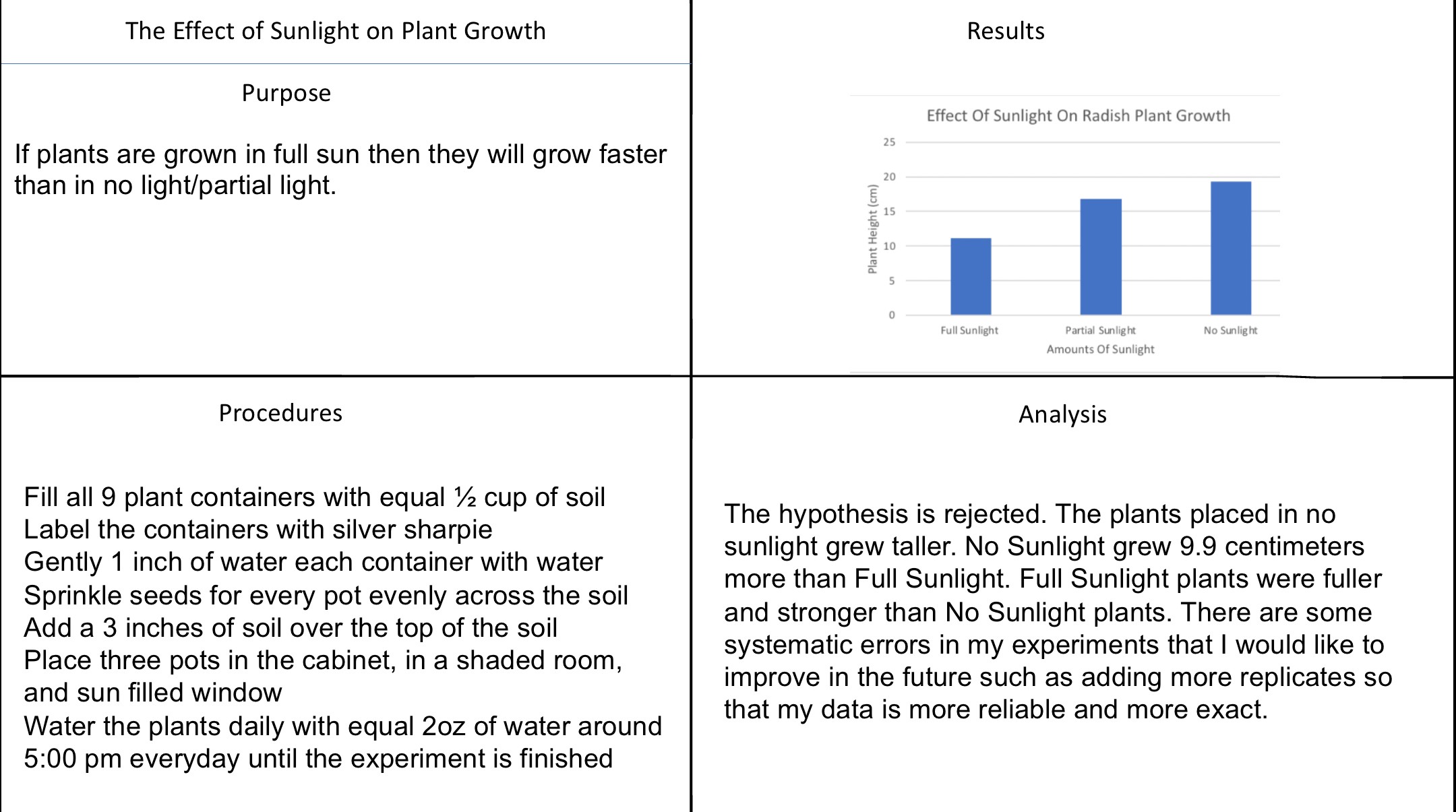How Does The Amount of Light Effect Plant Growth
Abstract:
Bibliography/Citations:
No additional citationsAdditional Project Information
Project files
Research Plan:
- Plan for 3 replicates in each environment and fill all 9 plant containers with equal ½ cup of soil
- Label the containers with silver sharpie
- Gently pour 1 inch of water each container
- Sprinkle seeds for every pot evenly across the soil
- Add a 3 inches of soil over the top of the soil
- Place three pots in the cabinet, in a shaded room, and sun filled window
- Water the plants daily with equal 2oz of water around 5:00 pm everyday until the experiment is finished
- Measure plant growth daily
Questions and Answers
1. What was the major objective of your project and what was your plan to achieve it? The major objective was to understand how sunlight impacts plant growth.
a. Was that goal the result of any specific situation, experience, or problem you encountered? There was no specific situation, I was just interested to test the hypothesis and setup and experiment. I had helped my dad plant grass seed in the yard and it grew in some areas but not others.
b. Were you trying to solve a problem, answer a question, or test a hypothesis? Yes, I was testing a my hypothesis that plants would grow more in full sunlight conditions as opposed to partial sunlight or no sunlight.
2. What were the major tasks you had to perform in order to complete your project? The major tasks include 1) locating areas in the home where plants could receive full sunlight, partial sunlight and no sunlight 2) planting the radish seeds 3) watering the seeds daily 4) measuring the plant growth daily and 5) analyzing the results against against the hypothesis
a. For teams, describe what each member worked on. This project was independent.
3. What is new or novel about your project?
a. Is there some aspect of your project's objective, or how you achieved it that you haven't done before? This was the first time I ran an experiment like this where I developed a hypothesis, introduced replicates, had strong controls and performed daily analysis.
b. Is your project's objective, or the way you implemented it, different from anything you have seen? Not that I am aware of. I believe this would be the most common way to test the hypothesis.
c. If you believe your work to be unique in some way, what research have you done to confirm that it is? I do not believe this work is unique.
4. What was the most challenging part of completing your project? The most challenging was performing all the activities each day, and specifically keeping up with the watering schedule as the some of the plants were not absorbing all the water.
a. What problems did you encounter, and how did you overcome them? The problem I encountered was that the constants I set for daily amounts of water to add may have been too much. When I went to add water to the partial sunlight and no sunlight plants, the water added from the previous day still had not been absorbed and you could see sitting water in the plant tray. I adjusted the amount of water for all sun environments on days where there was still sitting water.
b. What did you learn from overcoming these problems? I learned that the controls need to be looked at throughout the research project and to perform even more research on daily water levels and other controls before the project.
5. If you were going to do this project again, are there any things you would you do differently the next time? I would add less water to each of the replicates and I would also increase the number of replicates. I used three in each environment for this project.
6. Did working on this project give you any ideas for other projects? Yes, I wondered how different types of lights could impact plant growth. In this experiment I used sunlight only, full, some and none. It could be interesting to compare growth using the uv light, regular lighting and sunlight.
7. How did COVID-19 affect the completion of your project? Covid had no impact on this experiment as it took place in my home and I was not sick during the research.

